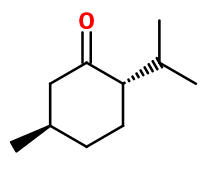Menthone®
Naturelle - Synthétique
Herbal > Minty > Icy > Fatty > Earthy

Crédits photo: ScenTree SAS
Other names :
5-methyl-2-propan-2-ylcyclohexan-1-one ; Para-menthan-3-one ; 5-methyl-2-(1-methylethyl)cyclohexanone ; 2-isopropyl-5-methyl cyclohexanone
Volatility :
Head
Uses in perfumery :
Menthone® is used in minty notes, for a deep and liquorice note. Allows to nuance the cold sensation of L-Menthol and L-Carvone in a mint reconstitution. Gives a very sweet and frosty mint effect.
Natural availability :
The natural production of Menthone® can be made from a dementholised Corn Mint EO (see L-Menthol).
Year of discovery :
Data not available.
Other comments :
Menthone® is less green than L-Carvone, but fresher, and more foody than L-Menthol.
Price Range :
€€
Stability :
Stable in perfumes and diverse functional bases

Crédits photo: ScenTree SAS
- Molecular formula :
- C10H18O
- Molecular Weight :
- 154,25 g/mol
- Density :
- 0,895
- Flash Point :
- 79°C
- Fusion Point :
- -20°C
- Appearance :
- Colorless liquid
- Log P :
- 3,05
- Boiling Point :
- 209°C
- Detection Threshold :
- 170 ppb (0,000017%)
Synthesis route :
Synthetic Menthone® is produced by a dehydrogenation of L-Menthol, with the presence of catalytic copper and chromium. A hydrogenation of Thymol, catalysed by palladium, also allows to obtain a racemic mixture of Menthone® isomers.
Synthesis precursor :
Menthone® is a precursor to the synthesis of Menthol by catalytic hydrogenation, forming NeoMenthol and Menthol.
Isomerism :
Menthone® is a mixture of two pairs of dextrorotatory and laevorotatory isomers: Menthone® and Isomenthone. Isomenthone has a more moldy smell than Menthone®. These two enantiomers have a strong tendency to interchange, making it difficult to separate them from synthetic Menthone® or from an essential oil. In the synthesis of Menthone®, the isomers of the molecules can be selected by changing the synthesis conditions or the starting reagent (for example, dehydrogenated or oxidized L-Menthol gives a mixture of L-Menthone® and D-isomenthone).
Linalool, Nerol, Geraniol and Terpineol are some of the constitutional isomers of Menthone®. Nevertheless, they have a much more floral or terpenic smell, far from the frosty mint note of Menthone®.
- EINECS number :
- 201-941-1
- FEMA number :
- 2667
- JECFA number :
- 429
- FLAVIS number :
- 07.176
- Allergens :
- This ingredient does not contain any allergen.
- IFRA :
- This ingredient is not restricted
To learn more about IFRA's standards : https://ifrafragrance.org/safe-use/library
ScenTree is solely responsible for the information provided here.

